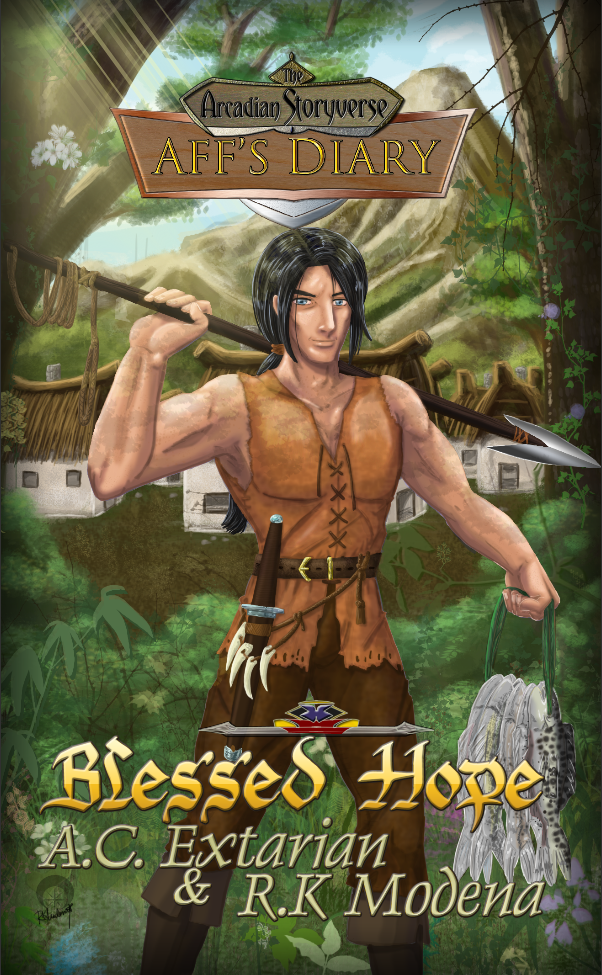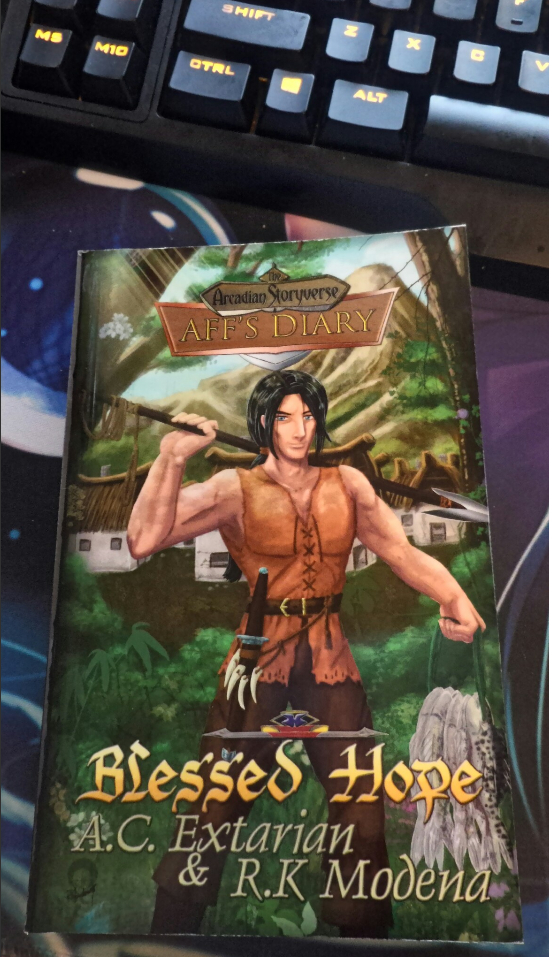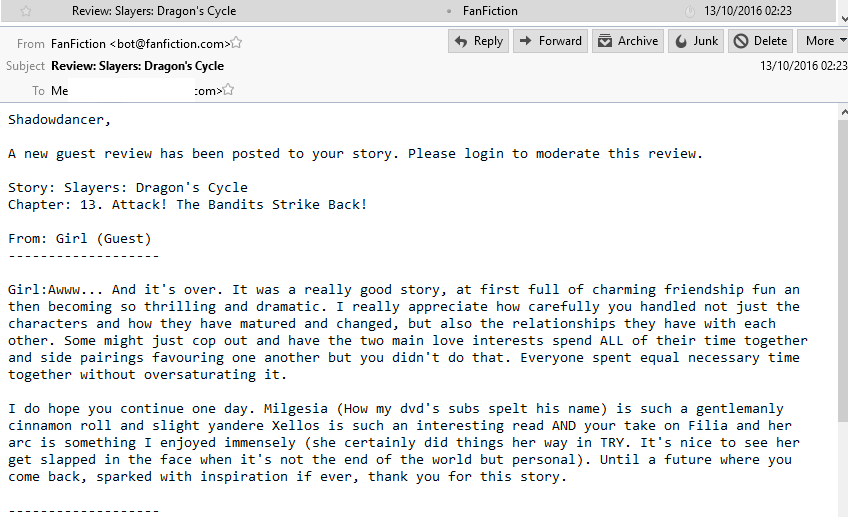Reposting this comment I made in reply to a comment over at Larry Correia’s blog just now, in reply to a fanfic writer who is having her joy stolen from her by people who were hurt by something that she wrote in a story.
Don’t let them steal the joy from you, because every person who loses the joy in creation is one less person who could make the world a little bit brighter. Reading over your description, I think you handled it (the scene and character reactions) well. The fact is, regardless of your intentions, there will always be people who will misinterpret how you wrote a scene (sometimes, wilfully) and use it to rant at you for something that is probably completely unrelated. This is ridiculously common these days.
Remember that there are people out there who will take offence no matter what you do, or how careful you are. For every person who gets upset, there may be a person further along who might relate to the scene in a positive manner, or appreciates that you made a point of trying to portray what is a sensitive scene well, despite how difficult it is to write.
Keep writing. Keep telling stories. Don’t give up what’s important to you, and don’t let someone else define who or what you are. If you lose this thing that makes you happy, that gives you joy, what else will they be able to take away, till there’s nothing left? And sometimes, having that little something you can hold on to makes all the difference in the world.
First, allow me to state my bafflement about a couple of things. Obviously she wrote a story well enough that it affected her readers. To me, that’s the hallmark of a good writer. The way a story affects the reader is well, really out of the hands of the writer, as far as I can tell, because it’s not something the writer can control. Someone else’s emotions, or actions, or reactions are their own. I’ve had traumatic experiences, and sometimes I’ll read something that reminds me about it (‘triggers’ it seems to be the word for it these days), and I’ll have flashbacks, I’ll remember the event, how I felt… and sometimes it’ll be too much for me to handle just then. I’ll put away the thing I’m reading. I’ll cry. I might be depressed and upset and seek comforting from my darling Rhys, or cuddle my children. Sometimes I’ll wish I had a closet I could climb into and hide in for a little while (metaphorically speaking).
Do I blame the writer for my reaction? Hell no! The writer is not omniscient outside of their story, the writer is just a human being. The writer does not know my personal problems or hurts, or inner wounds and scars; nor should they write around me to accommodate that. I’m aware that bad things happen to people in the world, and that the world cannot protect you from the horrible things that happen. I don’t pretend that the writer has an OBLIGATION to not write about the horrible stuff either, just ‘in case’ they will trigger someone’s horrible memories. The writer is not obliged to be endlessly sensitive and aware of all the things out there that have happened to other people and tiptoe around the readers’ potential negative reaction. You can’t predict that! And a writer cannot control another person’s reaction, especially if they’ve actually worked to try be sensitive and accommodating as far as the story can handle it. Don’t go screaming at the writer for your reaction, your pain, your hurt. You can choose how to act – you can choose never to look at that story again. You can politely tell an author that this scene triggered you and made it difficult for you to finish the story… or you can talk to your friends about it. There’s a whole list of things you can do yourself, for your reaction. Comfort yourself, read something else, walk away and maybe come back to the story later if you decide to. Don’t look at the thing that made you unhappy. Don’t rail at someone else for the existence of a reminder simply because they’d included it in a story.
Yes, there are plenty of stories written of rape, murder, torture and worse. They’re very common in detective mystery and thriller genres, crop up in fantasy, sci-fi, and war stories, or stories about crime and human trafficking. They also crop up in the news and in history books. They’re an unfortunate part of reality. They come up in discussions, in talks – are you going to scream at random people for simply talking about it? If not why is it ‘okay’ to rail at someone for including it in a story?
The above reaction puzzles me beyond belief, but it seems to be a very common reaction now – to make someone else feel bad in retaliation for negative reactions and feelings. It has become increasingly common and ‘accepted’ behaviour to hound someone who holds a different opinion, for not jumping on a bandwagon, for hesitating, or going ‘wait a minute’. Worse, ‘how dare you be happy about something I don’t like/agree with/hate.’
Welcome to thought policing, and welcome to having one’s individuality stolen away by what the SJWs deem is ‘acceptable’ – a rapidly changing, frequently contradictory mindset that honestly, reminds me deeply of the way cults function. And before someone decides to jump on me about religions, I’ll remind you that cults of persons existed throughout history, and had nothing to do with religion. March yourself to the library and read up on Mao, Hitler, Stalin, Che Guevara, Pol Pot, and practically any 20th century tinpot Socialist and Communist strain there was. Oh and trigger warning horrible stuff, because it’s history and reality.
Larry Correia’s post, Why I Don’t Like SJWs, identifies a deep problem in the current iteration of an old, familiar war – well, familiar to those who are students of history, not the whitewashed stuff that seems to be common these days. Thought policing is an old tool, and we’re seeing it not just in SFF, but things like the later wave of #Gamergate – and no, I’m talking about the part where the anti-GGs went after anyone who was supportive of #NotYourShield or #GamerGate because they don’t like being told what not to like and what not to play, and didn’t actually care about Sarkeesian, Brianna Wu and whoever else there, didn’t like the dishonesty in the gaming review sites, and otherwise simply disagreed, or refused to be the excuse that the anti-GGs were using to destroy other people’s lives. The reasons for support simply were ignored, en masse, even if they were completely reasonable, and anti-GGs used it to destroy lives. Frankly, if people want to make SJW games, I have no problem with that at all. But don’t make me play Depression Quest, or whatever the hell game it is Brianna Wu made, because I really don’t have fun being depressed and I don’t like the graphics for Wu’s game.That’s all the reason I have for not wanting to and that’s pretty valid, and honestly have nothing to do with their politics or stances.
We’re seeing reflections of this insane zerg rush dogpile of condemnation regardless of facts and proof in other things such as the UVa /Rolling Stone scandal, which will undoubtably hurt real rape victims in the long run even more, but is now being also used as an excuse to condemn anyone who is reasonably sceptical of an accusation. For example in the UVa story: If she was lying on glass for three hours being assaulted, why didn’t she seek medical treatment? She should have scars, horrible ones. Who helped her remove the pieces of glass? Her friends do not recall seeing her bleeding, and if she were really afraid of speaking out or going to the police for fear of social penalization, this does not seem to be the case in going around talking with rape awareness groups. Similarly, Lena Dunham’s claims of having been sexually assaulted but for some reason never seeking legal aid or justice, echo this strange reluctance to seek legal justice, but the insinuations are instead published in a book. Now that the story has been exposed as being at best ‘bad journalism’, to a confirmation bias affirming slander piece at worst, people are trying to handwave it away, while using variations of shaming terms and shut up methods to broad-brush and paint opponents as pure evil (Victim blamers, rape culture supporters, misogynists, etc).
These are not new tactics. They’re old and have been used to terrifying effect in places like Mao’s China, in the uses of it in Stalinist Russia, Nazi Germany and Socialist Germany abound (don’t take my word for it, go research) and the end goal is still the same: to create new enemies, to inspire terror, and keep control of the ‘masses,’ to hector them and terrify them from committing the ‘sin’ of badthink. If you don’t fall in line, they will destroy you, regardless of how you really behaved, and it doesn’t matter how much you originally contributed to those around you. The most abject tyranny has been under the non-religious movements such as Communism and Socialism, as they would not work without this ghostly enemy to constantly struggle against, the hammering down of free thinking individuals to prevent too closely looking at the handwaved speech and actions. Reason, logic and sense has no place in the world of thought police, only obedience, blind support, and if you falter even for a moment in trying to tear apart the newest enemy – even if it were your beloved spouse, parents, children – you too would be punished.
Sound horrifying? Well, it’s not news to the people who have been aware of it for a long, long time.
Does it sound a hell of a lot like abuse? Well, let’s look at this wonderful quote by Synova.
Some of the comments by people who had been subject to the full treatment just made me want to cry. I didn’t think it was funny because the guilty parties and enablers aren’t the ones who are hurt. Yes, we can scoff at Scalzi when he makes a rational counter-argument and is made, ultimately, to retract and abase himself and agree in public and start proselytizing in public that no… you really can’t trust your own brain and if something seems wrong to you or you feel like defending yourself it is simply proof that you’re guilty.
But there were people who reported rather severe PTSD type reactions to even sitting down at a keyboard to write because they were so terrified of offending… again. Because *rationally* they’d done nothing wrong the first time, but they were forced to an irrational acceptance of their guilt. So now they’ve “accepted their privilege” and “checked it” and confessed and repented (they could come to the Dark Side and be welcomed, but they don’t know that, and have been taught that the Dark Side is evil, and that’s why shunning is so very evil within closed communities… being exiled is a horrific punishment) but since they had NO IDEA how they could have done something wrong in the first place, they also have no idea how to avoid it the next time.
Imagine doing this to a child.
The kid is walking through a room doing nothing much and suddenly POW… and then you tell the kid… well that was YOUR fault. You screwed up. You stepped on that spot on the floor.
So the kid looks at the spot and it looks like every other spot. But the kid is told that, no, the fact that she can’t even SEE the spot is what the problem is. You can’t SEE the spot… that’s why it is YOUR fault. Also, a good child will try to learn. You’re a good child, aren’t you?
So the kid says, yes… it was my fault. I could not SEE the spot. Not seeing the spot makes this my fault.
Afterward, it’s still impossible to see the spots, and walking across the room becomes fraught with danger. Sitting down at the keyboard gives this very “good” person the shakes and panic attacks… where are the spots? She still can’t see the spots but she MUST agree and believe that those spots exist.
I have a LOT of sympathy for those who were hurt, just like I have sympathy for any abused person.
Yes, it’s abuse. It’s horrible, it’s dehumanizing, and it’s wrong. That’s why I replied the way I did to the poor fanfiction writer, who I honestly do not know personally, because my heart hurt that s/he was losing his/her joy in writing.
These are good things to remember, so I will continue with quotes.
Larry Correia:
The SJWs say they stand for equality. Only they don’t. That’s a smoke screen. They are champions of diversity, provided that everyone is diverse in exactly the same approved manner. At their core they are petty, vengeful, tyrannical thought police, who simply can’t abide someone sinning. They’re an unholy cross between puritans and communists, with a heavy dose of Zanax, and severe self-esteem issues.
Social Justice Warriors are control freaks. Nothing more. Their bizarre antics have given true feminists a bad name. Their mad accusations of racism against anything and everything causes real racism to get lost in the background noise. By accusing well meaning, good intentioned individuals of horrible crimes, they legitimize and empower the real criminals.
…
SJWs stifle artistic creativity. When artists, authors, designers, and creators are afraid of crossing the invisible lines, art suffers. What some of you haven’t realized yet however is that the lines just aren’t invisible, they move based upon how much the SJWs like you. Basically, if you are on their shun list, no matter what you do, you will give offense and cause outrage. And if you are one of them, you have a dispensation to sin freely.
If the SJWs decide you are an enemy anything you do is automatically sexist, racist, homophobic, or something, and they will tell thousands of complete strangers all about it. Regular nice people don’t like being accused of horrible, vile things, so usually they fall back in line. Of course, actually reading the books or knowing anything about the author is unnecessary before slandering them, which is how come to them I’m a white guy with white privilege who writes about manly white men doing white things for white people.
For those who end up on the shun list, if you have a minority character you are guilty of “tokenism” or worse, “cultural appropriation” which is a totally asinine concept, especially in a nation based upon cultural appropriating every winning idea and strategy in the history of the world. My children are Portuguese, Danish, Finnish, Russian, Jew, Mormons, descended from conquistadors, Vikings, cowboys, pioneers, and prophets, and we had Indian food for dinner last night before watching a Japanese TV show while I glued together pieces of a Spanish war game. My ancestors introduced the chili pepper to Thailand and my wife’s ancestors were legal to shoot on sight in Missouri. Who the hell do you think you are to tell an American not to culturally appropriate stuff?
However, if you are a SJW approved writer you can write tweets that are so blatantly, absurdly bigoted and racist that if you do a find and replace of White Man for Jew it would read like a Heinrich Himmler speech.
The SJW’s campaign of suppression is insidious and far reaching. They don’t just come after you after you’ve created, they scare you before you start.
…
This stuff is pervasive. It is everywhere. Don’t do this. Don’t do that. I got involved in the End Binary Gender nonsense because I actually like encouraging writers, especially new ones. SJWs like scaring writers. They’ll lecture you on forbidden topics and forbidden words, because the most important thing in the creative process is that the author walk on egg shells, worried that he might inadvertently sin.
One of the things I’ve constantly puzzled about is how these people find so much time to do nothing but hunt down and search and destroy any possible targets they could find. Some of them will latch on and refuse to let go of a target for years – in this I have personal firsthand experience and have been documenting several years worth of stalking and abuse
- and some will not give up until they have destroyed their target in every possible way, not just online, but in ways that affect their lives outside of the Internet. The dedication is insane, the obsession and determination, something most people simply cannot comprehend. Most people can’t understand unreasoning, unwarranted hate.
It doesn’t take a psychologist to understand that this hate gives them purpose, fills their otherwise rather empty lives. It makes them feel good to believe they’re doing something good. Now, not all SJWs are like the noisiest of them all. Some of them sincerely believe – or are mistaken about – something they think is a Bad Thing, or a Good Thing. Some of them are young, and some haven’t seen how this approach of zerg swarm damages more than what they intended. The SJW over-reach is starting to find opposition, especially when the cannibals eat their own. But the noisiest, the most rabid, thrive on destroying other people’s security. They themselves cannot honestly create because they are hampered by the belief that ‘someone else is in their way’ and blame this vague ‘other’ for whatever it is they lack. This is why they must constantly have an ‘enemy’ to struggle against. Without this imaginary dragon to slay, they don’t really have anything better to do, nothing to fill their time. And, for reasons that make no sense, these people seem to think that if they don’t like what makes you happy, you should not be happy about what you like, and you should feel bad because they don’t like it.
It’s like saying you should like only one kind of apple, and only the apple they approve of. You’re not allowed to have any other kind of apple, can’t look at any other fruit for the matter, because THEY think only ONE apple is good, and all the rest is bad. That doesn’t make any sense, does it?
You can’t please everyone, you won’t like the same exact things someone else does. Seek instead to make yourself and other like-minded or appreciative people happy. Work at improving your craft – whatever it may be!- and learn to identify when critique is honestly given, and when it isn’t, and when not to listen. I’m not saying don’t grumble about something when it makes you unhappy or discontent – but don’t let it take over your time to the point you aren’t creating, aren’t enjoying.
I’ll leave you with Larry’s words of hope and encouragement. Know that you’re NOT alone. You don’t have to be loud and noisy. Just quietly refuse to surrender, and refuse to let them steal your joy.
The solution?
For creators, don’t play by their rules. Write what you want. Write about what inspires you. Make up whatever characters you think make for the most interesting story.
When the SJWs come for someone, and you know that they are liars, stand up for the truth. When they form an angry mob, at minimum don’t join in. If you’re like me and not adverse to confrontation, fight back. Tell the truth. When they say something bug nuts crazy, you’re not doing anyone any favors by validating their stupid opinion.
Don’t let them set the terms. When they say you’re something-ist, and you’re clearly not, tell them so. Never accept their lies. When they start explaining how you’re guilty because of invisible privilege, micro aggressions, or original sin, then all the observers will realize just how full of shit they really are.
When they judge someone based upon the color of their skin or their sex, rather than the content of their character or the quality of their ideas, call them on their bigotry.
Don’t let them determine what constitutes an acceptable response. They will show up, insult you, and then demand polite debate. An SJW can malign and insult you all day, but when you respond in kind, they call you rude, aggressive, hateful, and so angry, why you need to be dismissed! This is a one way street. They do it to individuals, groups, and even entire political movements. SJWs will pick the most bat shit crazy person on the opposition’s side and use them as the poster child to tar the whole movement. And if one of those people doesn’t exist, they’ll fabricate one.
When you’ve reached that point, you’ve got nothing to lose. Mock them relentlessly. When you discover that you’re dealing with a Concern Troll, just skip ahead to where you are going to end up inevitably anyway. The onlookers will appreciate your honesty.
SJWs are predictable in their responses. When I inevitably get attacked for this blog post, it’ll be all about how I’m something-ist or something-phobic, and want to keep Group X out of Industry Y. It is all about dismissing their opponent. The truth is optional.
Their predictability makes them vulnerable. Their toolbox is limited. That is why they can’t just condemn Requires Hate’s dirty tricks, because they those same dirty tricks are all they’ve got to cow the opposition into silence.
One thing you need to realize before joining in this fight, the goal isn’t to convince the SJWs. Swaying the decided is a nearly insurmountable task. The real goal is to convince the undecided, and debate is a spectator sport. When one side has nothing but lies, slander, and intimidation, all you need to do is expose them for what they really are.
Above I talked about the eternal human theme of light vs. dark. You’ll note in most of those mentioned religious texts from all over the world light and truth go hand in hand. The darkness hides the truth. SJWs thrive on ignorance, bigotry, hate, and fear. It is time to turn the light on and watch the cockroaches scatter.




